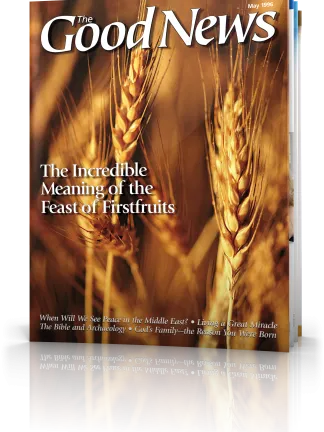Just What is the Holy Spirit?

Is it the third person of the Trinity, or something altogether different? You might be surprised at what the Bible really says!
Exactly who-or what-is the Holy Spirit? Many assume that the Holy Spirit, along with God the Father and Jesus Christ the Son, form what is commonly known as the Trinity. This doctrine expresses a belief in one God who exists in three distinct but equal persons. Is the Holy Spirit a third divine person, along with God the Father and Jesus Christ?
The word Trinity doesn't appear anywhere in the Bible. It didn't come into common use as a religious term until after the Council of Nicea (A.D. 325), several centuries after the last books of the Bible were completed.
A.W. Tozer, in his book The Knowledge of the Holy, writes that the Trinity is an "incomprehensible mystery," and that attempts to understand it "must remain forever futile." He admits that churches, "without pretending to understand," have nevertheless continued to teach this doctrine. He concludes, "The fact that it [the Trinity] cannot be satisfactorily explained, instead of being against it, is in its favor" (Harper & Row, New York, 1961, pp. 17, 18, 23).
Unger's Bible Dictionary, in its article on the Trinity, concedes that the Trinitarian concept is humanly incomprehensible: "It is admitted by all who thoughtfully deal with this subject that the Scripture revelation here leads us into the presence of a deep mystery; and that all human attempts at expression are of necessity imperfect" (Moody Press, Chicago, 1966, p. 1118).
Why is the concept of the Holy Spirit as a third person of a supposedly triune Godhead, along with God the Father and Jesus Christ, so difficult to grasp?
Because the Bible does not teach it! You cannot prove something from the Bible that is not biblical. The Bible is our only reliable source of divine revelation and truth, and the Trinity concept is not part of God's revelation to humankind.
The Holy Spirit-the power of God
The Holy Spirit, rather than being a distinct person, is spoken of in the Bible as being God's divine power. The Anchor Bible Dictionary, in its article on the Holy Spirit, describes it as "[t]he manifestation of divine presence and power perceptible especially in prophetic inspiration" (Vol. 3, Doubleday, New York, 1992, p. 260).
Scripture refers to the Holy Spirit as the power of God (Zechariah 4:6; Micah 3:8). Paul told Timothy that it is the "spirit of ... power and of love and of a sound mind" (2 Timothy 1:7, emphasis added throughout).
Luke 4:14 records that Jesus Christ began His ministry "in the power of the Spirit." Speaking of the Holy Spirit, which would be given to His followers after His death, Jesus told them, "You shall receive power when the Holy Spirit has come upon you ..." (Acts 1:8).
Peter relates how "God anointed Jesus of Nazareth with the Holy Spirit and with power, [and Jesus] went about doing good and healing all who were oppressed by the devil, for God was with Him" (Acts 10:38). The Holy Spirit is here associated with the power by which God was with Him-the power through which Jesus Christ performed mighty miracles during His earthly, physical ministry. The Holy Spirit is the very presence of God's power actively working in His servants.
The apostle Paul's desire was that the members of the church in Rome would "abound in hope by the power of the Holy Spirit," in the same way that Jesus Christ had worked through him "in mighty signs and wonders, by the power of the Spirit of God" (Romans 15:13, 19).
Divine inspiration by the Spirit
Repeatedly the Scriptures reveal that God imparts His divine inspiration to His prophets and servants through the Holy Spirit. Peter noted that "prophecy never came by the will of man, but holy men of God spoke as they were moved by the Holy Spirit" (2 Peter 1:21).
Paul stated that God's plan had been "revealed by the Spirit to His holy apostles and prophets" (Ephesians 3:5), and that his own teachings were inspired by the spirit (1 Corinthians 2:13). Paul, in 1 Corinthians 2:9, 10, explains that God through His Spirit has revealed to us the things which He has prepared for those who love Him. God the Father is the Revealer, working through His Spirit in those who serve Him.
Jesus Christ told His followers that the Holy Spirit, which the Father would send to them, "will teach you all things, and bring to your remembrance all things that I said to you" (John 14:26).
It is through God's Spirit within us that we can gain spiritual understanding and insight. "For what man knoweth the things of a man, save [through] the spirit of man which is in him? Even so the things of God knoweth no man, but [through] the Spirit of God. Now we have received, not the spirit of the world, but the spirit which is of God; that we might know the things that are freely given to us of God" (1 Corinthians 2:11, 12).
Jesus Christ had this spiritual understanding in abundance. As the Messiah, He was prophesied to have "the Spirit of wisdom and understanding, the Spirit of counsel and might, the Spirit of knowledge and of the fear of the LORD" (Isaiah 11:2).
Other attributes of the Holy Spirit
The Holy Spirit is spoken of in many ways that demonstrate that it is not a divine person. For example, the Holy Spirit is referred to as a gift (Acts 10:45; 1 Timothy 4:14). We are told that it can be quenched (1 Thessalonians 5:19), that it can be poured out (Acts 2:17; 10:45), and that we are baptized with it (Matthew 3:11). It must be stirred up within us (2 Timothy 1:6), and it also renews us (Titus 3:5). These are certainly not attributes of a person.
This Spirit is also called "the Holy Spirit of promise ... the guarantee of our inheritance ... the spirit of wisdom and revelation ..." (Ephesians 1:13, 14, 17).
This Spirit is not only the Spirit of God the Father; it is also "the Spirit of Christ" (Romans 8:9; Philippians 1:19; 1 Peter 1:11). It dwells within Christians, leading and enabling us to be children of God (Romans 8:14).
In contrast to God the Father and Jesus Christ, who are consistently compared to human beings in their form and shape, the Holy Spirit is just as consistently represented in a completely different manner. It is described as appearing as a dove (Matthew 3:16; Mark 1:10; Luke 3:22; John 1:32) and as "tongues of fire" (Acts 2:3). Jesus Christ compared it with "living water" (John 7:37-39).
There is further evidence that the Holy Spirit is not a person, but is the divine power of God. In Matthew 1:20, we read that Jesus was begotten by the Holy Spirit (Moffatt translation). Yet Jesus Christ continually prayed to and addressed the Father, not the Holy Spirit, as His father (Matthew 10:32, 33; 11:25-27; 12:50; 15:13; 16:17, 27; 18:10, 35). He never represented the Holy Spirit as His Father.
Paul didn't acknowledge the Trinity
If God were a Trinity, surely the apostle Paul, who recorded much of the theological underpinnings of the early Church, would have understood and taught this understanding. Yet we find no such concept in his writings.
Paul's standard greeting in his letters to churches, as well as individuals to whom he wrote, is, "Grace to you and peace from God the Father and the Lord Jesus Christ." There is no mention of the Holy Spirit.
This same greeting, with only minor variations, appears in every epistle that bears Paul's name: Romans 1:7; 1 Corinthians 1:3; 2 Corinthians 1:2; Galatians 1:3; Ephesians 1:2; Philippians 1:2; Colossians 1:2; 1 Thessalonians 1:1; 2 Thessalonians 1:2; 1 Timothy 1:2; 2 Timothy 1:2; Titus 1:4; and Philemon 3.
The Holy Spirit is always left out of these greetings-an unbelievable oversight if the Holy Spirit were indeed a person coequal with God and Jesus Christ.
This is even more surprising when we consider that the churches to which Paul wrote had many gentile members from polytheistic backgrounds who had formerly worshiped numerous gods. Paul's epistles record no attempt on his part to explain the Trinity or Holy Spirit as a divine person equal with God the Father and Jesus Christ.
In Paul's writings, only in 2 Corinthians 13:14 is the Holy Spirit mentioned along with God the Father and Jesus Christ, and there only about our "fellowship of the Holy Spirit" (New International Version) with God and Christ.
The apostle Paul states clearly that "there is one God, the Father, of whom are all things ... and one Lord Jesus Christ ..." (1 Corinthians 8:6). He makes no mention of the Holy Spirit as a divine person.
Other perspectives
Jesus Christ did not speak of the Holy Spirit as a third divine person; instead He only spoke of the relationship between Him and God the Father (Matthew 26:39; Mark 13:32; 15:34; John 5:18, 22; 8:16, 18; 10:30; 13:3; 17:11). Some passages, like Christ's reference to the "Helper" or "Comforter" in John 14, 15 and 16, could easily be read as referring to a person. However, there is no reason to do so from the original language (see supplement article "Grammar Confuses the Nature of the Holy Spirit").
Most Bible scholars, as pointed out in many translation notes, agree that the one biblical passage that most obviously supports a Trinity-the latter portion of 1 John 5:7 and the beginning of the following verse-is readily acknowledged by Bible scholars as a spurious addition made long after John's epistle was written. The Expositor's Bible Commentary dismisses this passage as "obviously a late gloss with no merit" (Vol. 12, Zondervan Publishing House, Grand Rapids, 1981, p. 353).
In the final book of the Bible (and the last to be written), the Holy Spirit is conspicuously absent. The book describes "a new heaven and a new earth" (Revelation 21:1) wherein "the tabernacle of God is with men, and He will dwell with them" (verse 3). Jesus Christ, "the Lamb," is also there (verse 22). The Holy Spirit, however, is completely missing-an incredible oversight if this Spirit is the third person of a Trinity.






